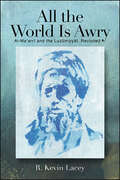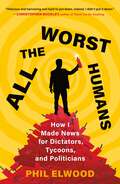- Table View
- List View
All the World Beside: A Novel
by Garrard ConleyFrom the New York Times bestselling author of Boy Erased, an electrifying, deeply moving novel about the love story between two men in Puritan New England.Cana, Massachusetts: a utopian vision of 18th-century Puritan New England. To the outside world, Reverend Nathaniel Whitfield and his family stand as godly pillars of their small-town community, drawing Christians from across the New World into their fold. One such Christian, physician Arthur Lyman, discovers in the minister&’s words a love so captivating it transcends language.As the bond between these two men grows more and more passionate, their families must contend with a tangled web of secrets, lies, and judgments which threaten to destroy them in this world and the next. And when the religious ecstasies of the Great Awakening begin to take hold, igniting a new era of zealotry, Nathaniel and Arthur search for a path out of an impossible situation, imagining a future for themselves which has no name. Their wives and children must do the same, looking beyond the known world for a new kind of wilderness, both physical and spiritual.Set during the turbulent historical upheavals which shaped America&’s destiny and following in the tradition of Nathaniel Hawthorne&’s The Scarlet Letter, All the World Beside reveals the very human lives just beneath the surface of dogmatic belief. Bestselling author Garrard Conley has created a page-turning, vividly imagined historical tale that is both a love story and a crucible.
All the World Is Awry: Al-Maʿarrī and the Luzūmiyyāt, Revisited
by R. Kevin LaceyFree-thinking poet, grammarian, social critic, and satirist, Abū al-‛Alā' al-Ma‛arrī (973–1057 CE) remains one of the more celebrated and intriguing personalities in the history of Arab Islamic civilization. Although the controversies surrounding his skepticism, cynicism, and anticlericalism have never been completely resolved, his more disquieting writings are commonly available in the Arab world, cited in standard histories of Arabic literature, and the subject of scholarly studies.Al-Ma‛arrī is universally recognized as a giant among the litterateurs of Islam, deservedly famous for the role that he played in the development of Arabic verse as a more serious vehicle of religious-political thought and social criticism. The centrality attributed to al-Ma‛arrī as innovator has been linked to a strain of inquiry that has been particularly paramount to Westerners: To what extent did al-Ma‛arrī and other unconventional thinkers stray from the course of mainstream Islamic thought?In this book, R. Kevin Lacey places al-Ma‛arrī within the broader context of Arab Islamic political and intellectual history up to the mid-eleventh century and identifies the coherencies and incoherencies within his overall thought in an effort to determine the extent to which he deviated from his inherited faith. Al-Ma‛arrī and his like were hardly representative, and their imprint on their co-religionists may be questionable, but they must be taken into consideration in order to do full justice to the intellectual history of Islam.
All the World Over: Notes From Alaska
by John MuirMuir explores into the vast and varied splendors of the natural world in Alaska.
All the World an Icon
by Tom CheethamAll the World an Icon is the fourth book in an informal "quartet" of works by Tom Cheetham on the spirituality of Henry Corbin, a major twentieth-century scholar of Sufism and colleague of C. G. Jung, whose influence on contemporary religion and the humanities is beginning to become clear. Cheetham's books have helped spark a renewed interest in the work of this important, creative religious thinker.Henry Corbin (1903-1978) was professor of Islamic religion at the Sorbonne in Paris and director of the department of Iranic studies at the Institut Franco-Iranien in Teheran. His wide-ranging work includes the first translations of Heidegger into French, studies in Swedenborg and Boehme, writings on the Grail and angelology, and definitive translations of Persian Islamic and Sufi texts. He introduced such seminal terms as "the imaginal realm" and "theophany" into Western thought, and his use of the Shi'ite idea of ta'wil or "spiritual interpretation" influenced psychologist James Hillman and the literary critic Harold Bloom. His books were read by a broad range of poets including Charles Olson and Robert Duncan, and his impact on American poetry, says Cheetham, has yet to be fully appreciated. His published titles in English include Creative Imagination in the Sufism of Ibn Arabi, Avicenna and the Visionary Recital, and The Man of Light in Iranian Sufism.As the religions of the Book place the divine Word at the center of creation, the importance of hermaneutics, the theory and practice of interpretation, cannot be overstated. In the theology and spirituality of Henry Corbin, the mystical heart of this tradition is to be found in the creative, active imagination; the alchemy of spiritual development is best understood as a story of the soul's search for the Lost Speech. Cheetham eloquently demonstrates Corbin's view that the living interpretation of texts, whether divine or human--or, indeed, of the world itself seen as the Text of Creation--is the primary task of spiritual life.In his first three books on Corbin, Cheetham explores different aspects of Corbin's work, but has saved for this book his final analysis of what Corbin meant by the Arabic term ta'wil--perhaps the most important concept in his entire oeuvre. "Any consideration of how Corbin's ideas were adapted by others has to begin with a clear idea of what Corbin himself intended," writes Cheetham; "his own intellectual and spiritual cosmos is already highly complex and eclectic and a knowledge of his particular philosophical project is crucial for understanding the range and implications of his work." Cheetham lays out the implications of ta'wil as well as the use of language as integral part of any artistic or spiritual practice, with the view that the creative imagination is a fundamentally linguistic phenomenon for the Abrahamic religions, and, as Corbin tells us, prayer is the supreme form of creative imagination.From the Trade Paperback edition.
All the World on a Page: A Critical Anthology of Modern Russian Poetry
by Andrew Kahn Mark LipovetskyThe rich and ongoing development of Russian lyric poetry, explored through close readings of thirty-four poems by poets ranging from Alexander Blok to Maria StepanovaThe Russian cultural tradition treats poetry as the supreme artistic form, with Alexander Pushkin as its national hero. Modern Russian lyric poets, often on the right side of history but the wrong side of their country&’s politics, have engaged intensely with subjectivity, aesthetic movements, ideology (usually subversive), and literature itself. All the World on a Page gathers thirty-four poems, written between 1907 and 2022, presenting each poem in the original Russian and an English translation, accompanied by an essay that places the poem in its cultural, historical, and biographical contexts. The poems, both canonical and lesser-known works, extend across a range of moods and scenes: Velimir Khlebnikov&’s Futurist revolutionary prophecy, Anna Akhmatova&’s lyric cycle about poetic inspiration, Vladimir Nabokov&’s Symbolist erotic dreamworld, Joseph Brodsky&’s pastiche of a Chekhovian play set on a country estate, Maria Stepanova&’s pandemic allegory of political repression, Galina Rymbu&’s energetic manifesto &“My Vagina.&”An introduction explores the abiding inspiration of modernism on the Russian lyric tradition. Kahn and Lipovetsky's separate chapter essays, informed by extensive knowledge of the existing scholarship and critical styles of interpretation, consider how the interplay of originality and tradition and form and voice work to engage the reader. The poems themselves, many of them in newly commissioned translations, operate outside state-mandated poetic styles to address the reader directly, &“tête-à-tête,&” as Brodsky said in his 1987 Nobel lecture. With each chapter devoted to a different poem, All the World on a Page allows readers to experience the richness of Russian poetry through poems and poets rather than through movements.
All the World's a Fair: Visions of Empire at American International Expositions, 1876-1916
by Robert W. RydellRobert W. Rydell contends that America's early world's fairs actually served to legitimate racial exploitation at home and the creation of an empire abroad. He looks in particular to the "ethnological" displays of nonwhites—set up by showmen but endorsed by prominent anthropologists—which lent scientific credibility to popular racial attitudes and helped build public support for domestic and foreign policies. Rydell's lively and thought-provoking study draws on archival records, newspaper and magazine articles, guidebooks, popular novels, and oral histories.
All the World's a Grave
by John ReedRead John Reed's posts on the Penguin Blog. An epic tragedy of love, war, murder, and madness, plucked from the pages of Shakespeare In All the World's a Grave, John Reed reconstructs the works of William Shakespeare into a new five-act tragedy. The language is Shakespeare's, but the drama that unfolds is as fresh as the blood on the stage. Prince Hamlet goes to war for Juliet, the daughter of King Lear. Having captured Juliet as his bride--by reckless war--he returns home to find that his mother has murdered his father and married Macbeth. Enter Iago, who persuades Hamlet that Juliet is having an affair with Romeo. As the Prince goes mad with jealousy, King Lear mounts his army. . . This play promises to be the most provocative and entertaining work to be added to the Shakespeare canon since Tom Stoppard's Rosencrantz and Guildenstern Are Dead.
All the Worlds Between Us
by Morgan Lee MillerSeventeen-year-old Quinn Hughes needs to be in top shape if she wants to medal at the swimming World Championships in ten months. This means no easy distractions, no matter how pretty they are. She's still piecing her confidence back together after not qualifying for the Olympics, her relationship with her twin brother is getting worse the more he hangs out with the popular kids, and then Kennedy Reed suddenly squeezes herself back into Quinn's life. The girl who was her best friend. The girl who gave Quinn her first kiss. The girl who hasn't spoken to her since. Soon, Quinn finds herself juggling her new girlfriend, training for the biggest competition of her life, and discovering she's not the only Hughes twin with a crush on Kennedy Reed. All these distractions are getting to her, and if she wants that medal she needs to find a way to stop drowning on dry land.
All the World’s a Stage: The Theater of Political Simulations
by Hemda Ben-YehudaClassroom role-playing simulations bring the drama of politics to life and enrich traditional learning by plunging students into the midst of historical or current events. Ben-Yehuda gives students and instructors the resources and confidence to embark on a careful enactment of scenarios that will inspire enthusiasm in participants and stick in the memory long after the curtain falls. The book includes in-depth discussions of three possible theatrical simulations: appeasement in 1938 Munich, the regional turmoil following the 1947 UN Palestine Partition decision, and the Syrian civil war and ongoing global confrontation with ISIS. It is appropriate for students in global studies courses at all levels.
All the Worst Humans: How I Made News for Dictators, Tycoons, and Politicians
by Phil ElwoodA New York Times Notable Book A New York Times Editors' ChoiceA New York Post Best Book of the YearAn Amazon Best Biography/Memoir "A rollicking, unexpectedly affecting story. . . It’s going to be one of the big, buzzy Beltway books of the year."—PoliticoA bridge-burning, riotous memoir by a top PR operative in Washington who exposes the secrets of the $129-billion industry that controls so much of what we see and hear in the media—from a man who used to pull the strings, and who is now pulling back the curtain.After nearly two decades in the Washington PR business, Elwood wants to come clean, by exposing the dark underbelly of the very industry that’s made him so successful. The first step is revealing exactly what he’s been up to for the past twenty years—and it isn’t pretty. Elwood has worked for a murderer’s row of questionable clients, including Gaddafi, Assad, and the government of Qatar. In All the Worst Humans, Elwood unveils how the PR business works, and how the truth gets made, spun, and sold to the public—not shying away from the gritty details of his unlikely career.This is a piercing look into the corridors of money, power, politics, and control, all told in Elwood’s disarmingly funny and entertaining voice. He recounts a four-day Las Vegas bacchanal with a dictator’s son, plotting communications strategies against a terrorist organization in Western Africa, and helping to land a Middle Eastern dictator’s wife a glowing profile in Vogue on the same time the Arab Spring broke out. And he reveals all his slippery tricks for seducing journalists in order to create chaos and ultimately cover for politicians, dictators, and spies—the industry-secret tactics that led to his rise as a political PR pro. Along the way, Phil walks the halls of the Capitol, rides in armored cars through Abuja, and watches his client lose his annual income at the roulette table. But as he moved up the ranks, he felt worse and worse about the sleaziness of it all—until Elwood receives a shocking wake-up call from the FBI. This risky game nearly cost Elwood his life and his freedom. Seeing the light, Elwood decides to change his ways, and his clients, and to tell the full truth about who is the worst human.
All the Wounds in Shadow: The Healing Edge - Book Two (The Healing Edge #2)
by Anise EdenFor fans of Karen Robards and Shiloh Walker, the mesmerizing sequel to the award-winning paranormal romantic suspense novel All the Broken Places. Cate&’s enemies aren&’t just surrounding her—they&’re inside her head. Therapist Cate Duncan has just accepted a job with the MacGregor Group, a unique collective of alternative healers. She&’s excited by the prospect of honing her empathic healing techniques among others like herself—aura readers, telepaths, crystal healers, and more. The fact that Cate just started dating Ben, her magnetic new boss, is an added bonus. Before Cate can settle into her new routine, the poisoning of a prominent neuroscientist draws the entire MacGregor Group into both a federal investigation and an even more insidious threat. But for Cate, unraveling the mystery means reopening wounds that had just begun to heal—and discovering differences between her and Ben that strain their budding romance. When a new crisis looms, Cate must trust in her colleagues&’ gifts and the strength of Ben&’s love, finding the courage to confront her deepest and most terrifying demons—or her own life will be at risk. &“Peopled with engaging characters and filled with intrigue, this book will delight readers of paranormal romance. This series occupies a special place at the top of my favorites list and I can&’t wait to see what Ms. Eden brings us next.&” —Rosanna Leo, author of Covet
All the Wrong Moves
by Merline LovelaceUSAF Lieutenant Samantha Spade and her techies try out the latest gizmos for the military. On a test run with the Ergonomic Exoskeletal Extension (EEEK), Sam stumbles over two dead bodies in the desert. With the help of handsome Border Patrol Agent Jeff Mitchell, Sam must unravel a cover-up involving an illegal arms deal.
All the Wrong Moves (Fab Life #2)
by Nikki CarterSunday Tolliver is gifted, smart and ready to take the music industry by storm now that she's signed a record deal. All she has to do is survive touring with her diva cousin, Dreya, and she'll finally get a shot at her R&B dreams. But the tour's mega-bad-boy star, Truth, refuses to believe that Sunday isn't feeling him - and a jealous Dreya is doing everything to make Sunday pay. When filming for a behind-the-tour reality show starts, Sunday's live-and-on-camera humiliation is threatening to derail her chances - and help Dreya cover up stealing her songs.
All the Wrong Moves (Fab Life #2)
by Nikki CarterFor one talented girl, reality bites. . . Sunday Tolliver is gifted, smart, and ready to take the music industry by storm now that she's signed a record deal. All she has to do is survive touring with her diva cousin, Dreya, and she'll finally get a shot at her own R&B dreams. But the tour's mega-bad-boy star, Truth, refuses to believe that Sunday isn't feeling him--and a jealous Dreya is doing everything to make Sunday pay. When filming for a behind-the-tour reality show starts, Sunday's live-and-on-camera humiliation is threatening to derail her chances--and help Dreya cover up stealing her songs. Now Sunday has one last chance to prove herself. And with the spotlight heating up, all bets are off--and this battle is on. . .
All the Wrong Moves (HBR Case Study and Commentary)
by David A. Garvin Christopher J. Mccormick Ralph Biggadike Paul Domorski Hauke MojeHBR Case Study
All the Wrong Moves: A Memoir About Chess, Love, and Ruining Everything
by Sasha ChapinAn enthralling journey into the world of chess--a story of heartbreak, obsession, failure, and the hunger for greatness.Sasha Chapin is a victim of chess. Like countless amateurs before him--Albert Einstein, Humphrey Bogart, and Marcel Duchamp among them--the game has consumed his life and his mind. First captivated by it as a member of his high school chess club, he found his passion rekindled during an accidental encounter with chess hustlers on the streets of Kathmandu. In its aftermath, he forgot to care about anything else. Like a spurned lover, he tried to move on, but he found the game more seductive the more he resisted it.And so, he reasons, if he can't defeat his addiction, he will try instead to master the game.All the Wrong Moves traces Chapin's rollicking two-year journey around the globe in search of glory. He travels to tournaments in Bangkok and Hyderabad. He seeks out a mentor in St. Louis, a grandmaster whose personality is half rabbi and half monk, and who offers cryptic wisdom and caustic insults ("you're the best player in your chair.") His story builds toward the Los Angeles Open, where Chapin is clearly outmatched and yet determined not to lose.Stylish, inventive, and laugh-out-loud funny, All the Wrong Moves is more than a work of history or autobiography. It is a chronicle of the highs and lows of obsession, of love pursued to its limits, and of a life driven by lust, terror, and the elusive possibility of victory.
All the Wrong Moves: A Memoir About Chess, Love, and Ruining Everything
by Sasha Chapin"A smart, funny, and slyly profound book about the dark ecstasies of obsessive love. Sasha Chapin is a gentlemanly Gonzo, a dirty Bond, and he writes like a dream."--Claudia Dey, author of HeartbreakerSasha Chapin is a victim of chess. Like countless amateurs before him--Albert Einstein, Humphrey Bogart, Marcel Duchamp--the game has consumed his life and his mind. First captivated by it as a member of his high school chess club, his passion was rekindled during an accidental encounter with chess hustlers on the streets of Kathmandu. In its aftermath, he forgot how to care about anything else. He played at all hours, for weeks at a time. Like a spurned lover, he tried to move on, but he found the game more seductive the more he resisted it. And so, he thought, if he can't defeat his obsession, he had to succumb to it. All the Wrong Moves traces Chapin's rollicking two-year journey around the globe in search of glory. He travels to tournaments in Bangkok and Hyderabad. He seeks out a mentor in St. Louis, a grandmaster whose personality is half rabbi and half monk, and who offers cryptic wisdom and caustic insults ("you're the best player in your chair"). His story builds toward the Los Angeles Open, where Chapin is clearly outmatched and yet no less determined not to lose.Along the way, he chronicles the highs and lows of his fixation, driven on this quest by lust, terror, and the elusive possibility of victory. Stylish, inventive, and laugh-out-loud funny, All the Wrong Moves is more than a work of history or autobiography. It's a celebration of the purity, violence, and beauty of the game.
All the Wrong Places: A Life Lost and Found
by Philip ConnorsThe prize-winning author of Fire Season returns with the heartrending story of his troubled years before finding solace in the wilderness. In his debut Fire Season, Philip Connors recounted with lyricism, wisdom, and grace his decade as a fire lookout high above remote New Mexico. Now he tells the story of what made solitude on the mountain so attractive: the years he spent reeling in the wake of a family tragedy. At the age of twenty-three, Connors was a young man on the make. He'd left behind the Minnesota pig farm on which he'd grown up and the brother with whom he'd never been especially close. He had a magazine job lined up in New York City and a future unfolding exactly as he'd hoped. Then one phone call out of the blue changed everything. All the Wrong Places is a searingly honest account of the aftermath of his brother's shocking death, exploring both the pathos and the unlikely humor of a life unmoored by loss. Beginning with the otherworldly beauty of a hot-air-balloon ride over the skies of Albuquerque and ending in the wilderness of the American borderlands, this is the story of a man paying tribute to the dead by unconsciously willing himself into all the wrong places, whether at the copy desk of the Wall Street Journal, the gritty streets of Bed-Stuy in the 1990s, or the smoking rubble of the World Trade Center. With ruthless clarity and a keen sense of the absurd, Connors slowly unmasks the truth about his brother and himself, to devastating effect. Like Cheryl Strayed's Wild, this is a powerful look back at wayward years--and a redemptive story about finding one's rightful home in the world.
All the Wrong Places: A Novel
by Joy FieldingFour women--friends, family, rivals--turn to online dating for companionship, only to run afoul of a tech-savvy killer using an app to target his victims in this thriller from New York Times bestselling author Joy Fielding.A husband's death, a difficult divorce, a brutal dumping, dissatisfaction with a boring relationship: for various reasons, four women turn to the app "Mr. Right Now," hoping to right-swipe their way to love and happiness. Paige and Heather are cousins, locked in a lifelong rivalry that recently culminated in Heather taking Paige's boyfriend for herself, although now Heather isn't quite sure she wants him. Paige's mother, Joan, is trying to get back on her feet after the death of the love of her life two years ago. And Paige's longtime friend, Chloe, is trying to replace an abusive ex-husband as soon as the divorce papers are signed. Together, the women are navigating the choppy waters of online dating, until one of them unwittingly makes a date with a killer, starting the clock on a race to save her life.New York Times bestselling author Joy Fielding has written a complex, electrifying thriller about friendship, jealousy and passion--a deadly combination.
All the Wrong Places: A Novel
by Joy FieldingFour women—friends, family, rivals—turn to online dating for companionship, only to find themselves in the crosshairs of a tech-savvy killer using an app to target his victims in this harrowing thriller from the New York Times bestselling author of See Jane Run and The Bad Daughter. Online dating is risky—will that message be a sweet greeting or an unsolicited lewd photo? Will he be as handsome in real life as he is in his photos, or were they taken ten years and twenty pounds ago? And when he asks you to go home with him, how do you know it’s safe? The man calling himself “Mr. Right Now” in his profile knows that his perfect hair, winning smile, and charming banter put women at ease, silencing any doubts they might have about going back to his apartment. There, he has a special evening all planned out: steaks, wine, candlelight . . . and, by the end of the night, pain and a slow, agonizing death. Driven to desperation—by divorce, boredom, infidelity, a beloved husband’s death—a young woman named Paige, her cousin and rival Heather, her best friend, Chloe, and her mother, Joan, all decide to try their hand at online dating. They each download an app, hoping to right-swipe their way to love and happiness. But one of them unwittingly makes a date with the killer, starting the clock on a race to save her life. New York Times bestselling author Joy Fielding has written a complex, electrifying thriller about friendship, jealousy, and passion—a deadly combination.
All the Wrong Places: Sometimes Destiny Likes to Play... (Destiny's Games #Vol. 2)
by Jerilee KayeFrom Jerilee Kaye, author of best-selling novel “Knight in Shining Suit”, comes the spin-off of the top-grossing interactive story, “All the Wrong Reasons”. <p><p> One last adventure. That was all Julianne wanted. One last trip to escape the pressures of an arranged marriage to a man she doesn’t love and doesn’t even like. One last time to experience freedom… to go wherever she wanted to go, to be anyone she wanted to be. On her last two weeks in Paris, she met someone unexpected—aspiring painter, Jas Mathieu. He was as handsome as hell, and as sweet as heaven. He captured her heart, lit her fire and consumed her soul. She wanted to give Jas every part of herself, but she was already promised to a powerful man who could easily ruin the simple life of the guy she fell in love with. Terrified of what her father and fiancé could do to Jas if she stayed with him, she fled Paris and left him behind—with no real information about herself, not even her real name. Little did she know, that the passionate night they spent together would be the cause of her broken engagement and would change her life forever. <p><p> Seven years later, after her father stripped her of her heiress title and privileges, she crossed paths with Jas Mathieu once again. And this time, she found out that he wasn’t exactly the struggling artist she thought he was. And he was no stranger to the family and social circle she belonged to. It turned out that years ago, when they met... she wasn't the only one keeping secrets.
All the Wrong Questions: Also Published as "Who Could That Be at This Hour?" (All the Wrong Questions #1)
by Lemony Snicket SethBefore the Baudelaires became orphans, before he encountered A Series of Unfortunate Events, even before the invention of Netflix, Lemony Snicket was a boy discovering the mysteries of the world. Read the account of it all, in the debut volume of The New York Times bestselling series, available now with an intriguing new title and look.In the first of four volumes, Lemony Snicket recounts the time he spent as a young man in a fading town under the care of a dubious chaperone. Navigating the mysteries of childhood can be difficult, and for Lemony Snicket, the tangled plots that surround him include a missing father, a flooding basement, suspiciously young taxi drivers, a stolen statue, a peculiar librarian, and more information than is necessary about a secret organization.Penned in signature style, All the Wrong Questions: Question 1 (originally published as "Who Could That Be at This Hour?") invites readers to untangle the mysteries that surround young Lemony Snicket.
All the Yellow Suns
by Malavika KannanA coming-of-age story about a queer Indian American girl exploring activism and identity through art, perfect for fans of Aristotle and Dante Discover the Secrets of the Universe. Sixteen-year-old Maya Krishnan is fiercely protective of her friends, immigrant community, and single mother, but she knows better than to rock the boat in her conservative Florida suburb. Her classmate Juneau Zale is the polar opposite: she&’s a wealthy white heartbreaker who won&’t think twice before capsizing that boat. When Juneau invites Maya to join the Pugilists—a secret society of artists, vandals, and mischief-makers who fight for justice at their school—Maya descends into the world of change-making and resistance. Soon, she and Juneau forge a friendship that inspires Maya to confront the challenges in her own life. But as their relationship grows romantic, painful, and twisted, Maya begins to suspect that there&’s a whole different person beneath Juneau&’s painted-on facade. Now Maya must learn to speak her truth in this mysterious, mixed-up world—even if it results in heartbreak.
All the Young Dudes
by Ellie RussellQuestion: What do you get when you cross a not-so-lovable rogue with an uptight lawyer and throw a little Elvis into the mix? Answer: A thoroughly ripping page-turner of a yarn and a permanent residency in Heartbreak Hotel. Ellie Russell could certainly be forgiven for thinking somebody up there doesn't like her. Laugh with her, cry with her - be very glad you're not her!
All the Young Men
by Ruth Coker Burks’If I have one message with this book it’s that we all have to care for one another. Today, not just in 1986. Life is about caring for each other, and I learned more about life from the dying than I ever learned from the living. It’s in an elephant ride, it’s in those wildflowers dancing on their way to the shared grave of two men in love, and it’s in caring for that young man who just needed information without judgement.’























